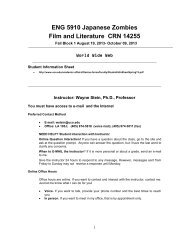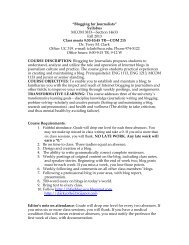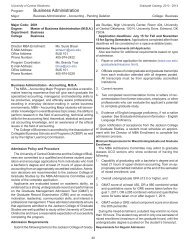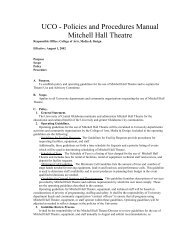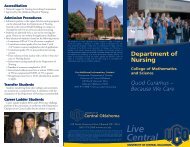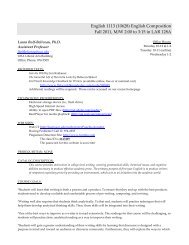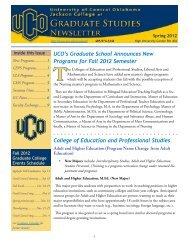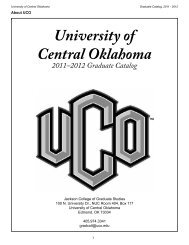Graduate Catalog - University of Central Oklahoma
Graduate Catalog - University of Central Oklahoma
Graduate Catalog - University of Central Oklahoma
Create successful ePaper yourself
Turn your PDF publications into a flip-book with our unique Google optimized e-Paper software.
<strong>University</strong> <strong>of</strong> <strong>Central</strong> <strong>Oklahoma</strong><br />
<strong>Graduate</strong> <strong>Catalog</strong>, 2012 - 2013<br />
<strong>Graduate</strong> Course Descriptions<br />
PHIL 5950 - Internship In Philosophy<br />
Credit will vary from 1 to 8 hours. Subject matter will vary within the<br />
department’s field <strong>of</strong> study. Supervised practical experience gained<br />
in a pr<strong>of</strong>essional field by an advanced or graduate student.<br />
PHIL 5960 - Institute In Philosophy<br />
Credit will vary from 1 to 8 hours. Subject matter will vary within the<br />
department’s field <strong>of</strong> study.<br />
PHIL 5970 - Study Tour<br />
Credit will vary. Subject matter will vary within the department’s field<br />
<strong>of</strong> study.<br />
PHIL 5990 - Thesis<br />
Credit will vary from 1 to 6 hours. Subject matter will vary within the<br />
department’s field <strong>of</strong> study.<br />
PHYSICS (PHY)<br />
Department <strong>of</strong> Engineering<br />
PHY 5013 - Mathematical Physics II<br />
This course discusses the mathematical solutions to boundary value<br />
problems found in electrostatics, mechanics, heat transfer, quantum<br />
mechanics, and acoustics. The mathematical topics may include<br />
curvilinear coordinates, Fourier analysis, Fourier transformers, partial<br />
differential equations, Green’s functions, tensor analysis and group<br />
theory. Prerequisite(s): PHY 3883.<br />
PHY 5033 - Nuclear Physics<br />
An introduction to the physics <strong>of</strong> the nucleus and elementary particles<br />
is presented. Basic models <strong>of</strong> nuclear structure, nuclear interactions,<br />
and nuclear reactions will be emphasized. The quark model along<br />
with the families <strong>of</strong> elementary particles and their interactions will be<br />
introduced. Prerequisite(s): PHY 3103 and PHY 3883.<br />
PHY 5043 - Solid State Physics<br />
The purpose <strong>of</strong> this course is to acquaint the students with the fundamental<br />
physics <strong>of</strong> solids. The emphasis will be on crystal lattices,<br />
elastic scattering <strong>of</strong> waves, bonding, atomic vibrations, electron states,<br />
dielectric and optical properties, and semiconductors. Prerequisite(s):<br />
PHY 3103 and 9 additional hours upper division level physics.<br />
PHY 5063 - Analytical Mechanics<br />
A vector analytical approach to particle and rigid-body dynamics<br />
is presented, including a brief introduction to the Lagrangian<br />
and Hamiltonian formulations <strong>of</strong> mechanics, and special relativity.<br />
Prerequisite(s): ENGR 2043.<br />
PHY 5071 - Nuclear Radiation Laboratory<br />
This laboratory course provides a thorough introduction to equipment<br />
and techniques <strong>of</strong> nuclear radiation detection and measurement. The<br />
experimental properties <strong>of</strong> the types <strong>of</strong> nuclear radiation, their origin,<br />
characteristics, detection and interaction with matter are emphasized.<br />
Prerequisite(s): PHY 3103 or concurrent enrollment.<br />
PHY 5103 - Classical Mechanics<br />
Lagrangian and Hamiltonian methods will be introduced and applied,<br />
as appropriate, to a variety <strong>of</strong> mechanical systems. Topics will<br />
include vibration theory, elasticity, fluid mechanics, and acoustics.<br />
Prerequisite(s): PHY 5063.<br />
PHY 5143 - Statistical Mechanics<br />
The kinetic theory <strong>of</strong> gases, including transport phenomena, and<br />
an introduction to classical and quantum statistical mechanics are<br />
presented. Prerequisite(s): ENGR 5023 and PHY 3883.<br />
PHY 5203 - Applied Electrodynamics<br />
Electromagnetic theory is applied to the description <strong>of</strong> static and timedependent<br />
electric and magnetic fields, electromagnetic radiation,<br />
wave guides, transmission lines, and related problems. Prerequisite(s):<br />
ENGR 5083 and PHY 5013.<br />
PHY 5443 - Quantum Mechanics<br />
An introduction to the theory <strong>of</strong> quantum mechanics and its applications<br />
is presented. Topics covered will include the historical development<br />
<strong>of</strong> quantum mechanics, the Schroedinger equation and its applications,<br />
the theory <strong>of</strong> operators, the theory <strong>of</strong> angular momentum, the<br />
hydrogen atom, and perturbation theory. Prerequisite(s): PHY 3103,<br />
MATH 3103.<br />
PHY 5643 - Directed Study<br />
This course is a directed study <strong>of</strong> a specialized aspect <strong>of</strong> industrial<br />
or applied physics.<br />
PHY 5900 - Practicum In Physics<br />
Credit will vary from 1 to 4 hours. Subject matter will vary within the<br />
department’s field <strong>of</strong> study.<br />
PHY 5910 - Seminar / Special Topics<br />
Credit will vary from 1 to 4 hours. Subject matter will vary within the<br />
department’s field <strong>of</strong> study.<br />
PHY 5920 - Workshop in Physics<br />
Credit will vary from 1 to 4 hours. Subject matter will vary within the<br />
department’s field <strong>of</strong> study. Normally involves lecture, films, guest<br />
speaker, etc. A grade <strong>of</strong> “P” or “F” is given.<br />
PHY 5930 - Individual Study In Physics<br />
Credit will vary from 1 to 4 hours. Subject matter will vary within the<br />
department’s field <strong>of</strong> study.<br />
PHY 5940 - Field Study In Physics<br />
Credit will vary from 1 to 9 hours. Subject matter will vary within the<br />
department’s field <strong>of</strong> study.<br />
PHY 5950 - Internship In Physics<br />
Credit will vary from 1 to 8 hours. Subject matter will vary within the<br />
department’s field <strong>of</strong> study. Supervised practical experience gained<br />
in a pr<strong>of</strong>essional field by an advanced or graduate student.<br />
PHY 5960 - Institute In Physics<br />
Credit will vary from 1 to 8 hours. Subject matter will vary within the<br />
department’s field <strong>of</strong> study.<br />
PHY 5970 - Study Tour<br />
Credit will vary. Subject matter will vary within the department’s field<br />
<strong>of</strong> study.<br />
PHY 5990 - Thesis<br />
Credit will vary from 1 to 6 hours. Subject matter will vary within the<br />
department’s field <strong>of</strong> study.<br />
POLITICAL SCIENCE (POL)<br />
Department <strong>of</strong> Political Science<br />
POL 5013 - Urban History Of Institutions & Environment<br />
The study <strong>of</strong> contemporary political, social, and economical institutions<br />
and environment <strong>of</strong> urban areas, placed in a historical context.<br />
POL 5023 - Scope Of The Discipline<br />
An analysis <strong>of</strong> the various fields <strong>of</strong> political science, as well as an<br />
assessment <strong>of</strong> the contributions <strong>of</strong> other disciplines and scientific<br />
approaches to the study <strong>of</strong> politics.<br />
POL 5033 - Research Methods<br />
This course provides an analysis <strong>of</strong> statistical techniques and research<br />
methodology commonly used in studying political phenomena. Included<br />
are probability theory, bivariate, and multivariate techniques<br />
through regression.<br />
251





